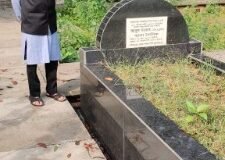
Rayhan Ahmed Topader:
The International Organization for Migration, an intergovernmental organisation linked to the United Nations, said the Bangladeshis wished to return home. But relatives and aid groups claimed that when a Bangladeshi envoy visited the boat the migrants were forced to accept their repatriation under the threat of having food, water and medical treatment being taken away. When all the people were on the boat, they were told by the Bangladeshi embassy that if they didn’t agree to sign, they would not get any food or water any more. The people were afraid to die on the boat. The Bangladeshi embassy forced them to sign. On 18 June, the 75 migrants, who included Egyptian, Moroccan and Sudanese people, were taken off the Maridive 601 and transferred to a Tunisian detention centre.Aid groups said the planned decree from Matteo Salvini amounted to a declaration of war against the NGOs who are saving lives at sea. The far-right interior minister’s decree which will be proposed to the council of ministers in the next few days and then voted upon by parliament would allow NGOs to be fined from €3,500 to €5,500 for each transported foreigner. Italy’s government is planning to issue a decree that would mean NGO rescue boats would be fined up to €5,500 (£4,760) for each migrant they disembark on to Italian soil. In the most serious cases, the licenses or authorisation to transfer people on board will be suspended for one month to a year.
The new decree reinforces the powers of the ministry of the interior in the matter of immigration and has the objective of putting an end to the NGO rescues. Médecins Sans Frontières, for example, would have had to pay €440m for saving 80,000 people if the decree had been in place during the last three years The new decree is threatening legal principles and the duty of saving lives, said Claudia Lodesani, president of MSF Italy. It is like fining ambulances for carrying patients to the hospital. The draft text of the security decree misinterprets the navigation code and the very basis of the international law applicable to the search and rescue, Giorgia Linardi of Sea-Watch said. The lives of people are reduced to a fine: a fine that actually goes to punish what is a moral and legal duty and a human act of solidarity. It shows the weakness of a government that is not able to guarantee control through democratic means and rather constantly feels the need to resort to the threat of using law enforcement. More than 30 migrants from Bangladesh who were trapped on a merchant ship off Tunisia for three weeks have been sent back to their home country against their will, according to relatives. They were among 75 migrants rescued on 31 May by the Maridive 601, an Egyptian tugboat that services offshore oil platforms, only to spend the next 20 days at sea near the Tunisian coast. The IOM confirmed that a few days later the first 17 individuals were returned to Bangladesh, and on 24 June, another 15 migrants were sent back.
More migrants will be travelling in the coming days, according to their decision. The Forum Tunisien pour les Droits Economiques et Sociaux (FTDES), an independent organisation that aims to defend economic and social rights, said: “We doubt that the decisions to return were made voluntarily by the migrants.
We have tried to visit the migrants in the reception centre in order to inquire about their wellbeing but despite making repeated inquiries and requests, the whereabouts of the detained migrants was not revealed. Another relative said: I spoke with my brother this morning in the centre. He is scared to be returned to Bangladesh, like all the people there. Nobody wants to return to Bangladesh; everyone who is returned is forced. The IOM’s head of mission in Tunisia, Lorena Lando, rejected the accusations. None of the migrants has been deported; [they] wished to return,” she said. IOM does not do deportation, nor force anyone to return. Thirty-two people have been injured after a fire that broke out at a migrant centre in Velika Kladuša, in north-west Bosnia-Herzegovina, police said.The blaze erupted early on Saturday morning at the centre, which hosts 500 people stuck in the Balkan country while trying to move towards western Europe.The fire was probably caused accidentally by a cooking device, a police spokesman, Ale Siljdedic, said.The speed of the fire’s spread forced some people to jump through windows to escape, Siljdedic said.Thirteen people remained in hospital with injuries, such as burns or fractures, he said.
The fire was put out after several hours. About 25,000 people from Asia and North Africa entered Bosnia-Herzegovina from Serbia and Montenegro last year, and about 6,000 had arrived in the impoverished Balkan country so far this year, according to the country’s security agencies. Only around 3,500 had been accommodated in transit centres, leaving thousands sleeping rough. Do we really believe that these Bangladeshi people risked their lives to move to Libya and then to try to cross the Mediterranean, only to then be ‘voluntarily’ returned to Bangladesh.Lando said the IOM “did not have access” to the migrants until 19 June, after the Tunisian authorities allowed their disembarkation. Remaining at sea was not a solution either. It is up to the person to also apply for asylum if they fear persecution or seek help to return home or take time to decide. A spokesperson for Alarm Phone, a hotline service for migrants in distress at sea that was alerted to the ship’s plight by crew members, said: The IOM refers to such deportations as voluntary returns but what is voluntary about telling survivors that they can leave their prison merely if they agree to be returned? Last year, De Falco was expelled by the M5S Movement, which governs in coalition with Salvini’s party, the League, for voting against a previous security bill, the so-called Salvini decree, drafted by the interior minister and targeting asylum rights.
The decree left hundreds in legal limbo when its removal of humanitarian protection for those not eligible for refugee status but otherwise unable to return home was applied by several Italian cities soon after its approval by parliament in December 2018. Salvini has repeatedly declared Italian waters closed to NGO rescue vessels. Several boats have been left stranded at sea because of this hardline approach, which is partly designed to force other parts of Europe to take in more people.Instead of criminalising NGOs that rescue migrants, Italy should mourn the victims of the latest tragedy at sea,” says Lodesani.Recently up to 70 people trying to reach Europe from Libya drowned after their vessel capsized in the deadliest such incident in the Mediterranean since January. According to survivors, at least 16 of whom were rescued, the boat left Zuwara in Libya, where renewed warfare between rival factions has gripped the capital, Tripoli, in the past five weeks. The vessel capsized 40 miles (64km) off the coast of Sfax, south of Tunis, as it headed towards Italy. So far this year, 17,000 people have sought refuge in Europe via the sea, about 30% less than in the same period last year, according to the International Organization for Migration. The IOM said 443 people had reportedly died on Mediterranean crossings since 1 January, compared with 620 in the same period in 2018.
The Institute for International Political Studies (ISPI) thinktank said that one person died for every eight people who left Libya between January and April, based on analysis of figures from the Italian interior ministry. The new rules contradict the constitution, Italian senator Gregorio de Falco, who is also a former coastguard official, told the Huffington Post.It means that those who save lives have to pay. But it must be borne in mind that those who do not save people go to jail because we have an obligation to save people in distress.
Writer and Columnist raihan567@yahoo.com
 Weekly Bangla Mirror | Bangla Mirror, Bangladeshi news in UK, bangla mirror news
Weekly Bangla Mirror | Bangla Mirror, Bangladeshi news in UK, bangla mirror news





